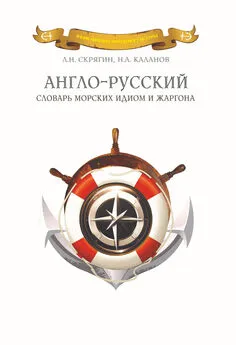Adam Makkai - Словарь американских идиом: 8000 единиц
- Название:Словарь американских идиом: 8000 единиц
- Автор:
- Жанр:
- Издательство:неизвестно
- Год:неизвестен
- ISBN:нет данных
- Рейтинг:
- Избранное:Добавить в избранное
-
Отзывы:
-
Ваша оценка:
Adam Makkai - Словарь американских идиом: 8000 единиц краткое содержание
Это обновленное и дополненное издание, содержащее более 8000 идиоматических
слов и выражений, причем каждое из которых снабжено грамматическим объяснением
и практическим примером. Словарь содержит лексемные идиомы, фразеологические
единицы и поговорки, имеющие особенное значение. В нем приведены наиболее
употребительные выражения только американского английского языка. Этот словарь — идеальное пособие для студентов, часто разъезжающих бизнесменов и просто
путешественников.
Словарь американских идиом: 8000 единиц - читать онлайн бесплатно полную версию (весь текст целиком)
Интервал:
Закладка:
[take it all in] {v. phr.} To absorb completely; listen attentively. •/ Bill’s piano music filled the room and we took it all in with admiration. /
[take it away] {v. phr.} , {informal} , {Theatrical expression} You’re on; it’s your turn; you’re next. •/ And here comes that wonderful comedian, Bob Hope. The announcer said, "Take it away. Bob." /
[take it easy] {v. phr.} , {informal} 1. or [go easy]or [take things easy]To go or act slowly, carefully, and gently. — Often used with "on". •/ Take it easy. The roads are icy. / •/ "Go easy," said Billy to the other boys carrying the table down the stairs. / •/ "Take it easy on John and don’t scold him too much," said Mrs. Jones to Mr. Jones. / •/ Go easy on the cake. There isn’t much left. / 2. or [take things easy]To avoid hard work or worry; have an easy time; live in comfort. •/ The doctor said that Bob would have to take things easy for awhile after he had his tonsils out. / •/ Barbara likes to take it easy. / •/ Grandfather will retire from his job next year and take things easy. / •/ Mr. Wilson has just made a lot of money and can take things easy now. /
[take it from the top] {v. phr.} , {informal} {Musical and theatrical expression} To start again from the beginning. •/ The conductor said, "We must try it once again. Take it from the top and watch my baton." /
[take it into one’s head]or {informal} [take a notion] {v. phr.} To get a sudden idea; decide without thinking. •/ The boy suddenly took it into his head to leave school and get a job. / •/ Grandmother keeps a bag packed so that she can go visiting whenever she takes a notion. /
[take it on the chin] {v. phr.} , {informal} 1. To be badly beaten or hurt. •/ Our football team really took it on the chin today. They are all bumps and bruises. / •/ Mother and I took it on the chin in the card game. / 2. To accept without complaint something bad that happens to you; accept trouble or defeat calmly. •/ A good football player can take it on the chin when his team loses. /
[take it or leave it] {v. phr.} , {informal} To accept something without change or refuse it; decide yes or no. — Often used like a command. •/ He said the price of the house was $10,000, take it or leave it. /
[take it out on] {v. phr.} , {informal} To be unpleasant or unkind to (someone) because you are angry or upset; get rid of upset feelings by being mean to. — Often used with the name of the feeling instead of "it." •/ The teacher was angry and took it out on the class. / •/ Bob was angry because Father would not let him use the car, and he took it out on his little brother. /
[take its toll] {v. phr.} To cause loss or damage. •/ The bombs had taken their toll on the little town. / •/ The budget cut took its toll of teachers. /
[take kindly to] {v.} To be pleased by; like. — Usually used in negative, interrogative, and conditional sentences. •/ He doesn’t take kindly to any suggestions about running his business. / •/ Will your father take kindly to the idea of your leaving college? /
[take leave of] {v. phr.} I. To abandon, go away from, or become separated from. — Usually used in the phrase "take leave of one’s senses". •/ Come down from the roof, Billy! Have you taken leave of your senses? / 2. See: TAKE ONE’S LEAVE.
[take leave of one’s senses] {v. phr.} To go mad; become crazy. •/ "Have you taken leave of your senses? "Jake cried, when he saw Andy swallow a live goldfish. /
[take liberties] {v. phr.} To act toward in too close or friendly a manner; use as you would use a close friend or something of your own. •/ Mary would not let any boy take liberties with her. / •/ Bill took liberties with Tom’s bicycle. / Compare: MAKE FREE WITH.
[take lying down] {v. phr.} To accept something without defense or protest. •/ If you take such insults lying down, you will only encourage more of the same. /
[taken aback]also [taken back] {adj.} Unpleasantly surprised; suddenly puzzled or shocked. •/ When he came to pay for his dinner he was taken aback to find that he had left his wallet at home. /
[taken by]or [with] {v. phr.} To be impressed by; intrigued by. •/ Ned was much taken by the elegance of Sophie’s manners. /
[take no stock in]See: TAKE STOCK IN.
[take note of]or [take notice of] {v. phr.} 1. To look carefully at; pay close attention to; observe well. •/ A detective is trained to take note of people and things. / 2. To notice and act in response; pay attention. •/ Two boys were talking together in the back of the room but the teacher took no notice of them. / •/ The principal thanked everyone who helped in the program, and took note of the decorations made by the art class. /
[take oath] {v. phr.} To promise to tell the truth or to do some task honestly, calling on God or some person or thing as a witness. •/ Mary took her oath that she did not steal the watch. / •/ John took oath that he would fill the office of president faithfully. /
[takeoff] {n.} 1. Departure of an airplane; the act of becoming airborne. •/ The nervous passenger was relieved that we had such a wonderfully smooth takeoff. / 2. Imitation; a parody. •/ Vaughn Meader used to do a wonderful takeoff on President Kennedy’s speech. /
[take off] {v. phr.} 1a. To leave fast; depart suddenly; run away. •/ The dog took off after a rabbit. / Compare: LIGHT OUT. 1b. {informal} To go away; leave. •/ The six boys got into the car and took off for the drug store. / 2. To leave on a flight, begin going up. •/ A helicopter is able to take off and land straight up or down. / 3. {informal} To imitate amusingly; copy another person’s habitual actions or speech. •/ He made a career of taking off famous people for nightclub audiences. / •/ At the party, Charlie took off the principal and some of the teachers. / 4. To take (time) to be absent from work. •/ When his wife was sick he took off from work. / •/ Bill was tired out so he took the day off. /
[take off one’s hat to] {v. phr.} To give honor, praise, and respect to. •/ He is my enemy, but I take off my hat to him for his courage. / Compare: HAND IT TO.
[take offense at] {v. phr.} To become indignant; become angry. •/ Why do you always take offense at everything I say? /
[take off one’s hands] {v. phr.} 1. To abdicate one’s responsibility of a person or matter. •/ "I am herewith taking my hand off your affairs," Lou’s father said. "See how you succeed on your own." / 2. To buy; relieve someone of something. •/ He offered to take my old car off my hands for $350. /
[take off the edge]See: TAKE THE EDGE OFF.
[take on] {v.} 1. To receive for carrying; be loaded with. •/ A big ship was at the dock taking on automobiles in crates to carry overseas for sale. / •/ The bus driver stopped at the curb to take the woman on. / 2. To begin to have (the look of); take (the appearance of). •/ Others joined the fistfight until it took on the look of a riot. / •/ After the students put up Christmas decorations, the classroom took on a holiday appearance. / 3a. To give a job to; hire; employ. •/ The factory has opened and is beginning to take on new workers. / Contrast: LET GO(4), LET OFF, LET OUT(6). 3b. To accept in business or a contest. •/ The big man took on two opponents at once. / •/ After his father died, Bill took on the management of the factory. / •/ We knew their football team was bigger and stronger, but we took them on anyway and beat them. / 4. {informal} To show great excitement, grief, or anger. •/ At the news of her husband’s death she took on like a madwoman. / Compare: CARRY-ON.
[take one at one’s word] {v. phr.} To naively lend credence to what one tells one. •/ It’s a bad idea to take street vendors at their word in large, crowded cities. /
[take one’s breath away] {v. phr.} To surprise greatly; impress very much; leave speechless with surprise or wonder or delight; astonish. •/ The sunset is so beautiful it takes our breath away. / •/ His refusal was so unexpected it took my breath away. / Compare: CATCH ONE’S BREATH(1).
[take one’s death of]See: CATCH ONE’S DEATH OF.
[take one’s leave]or [take leave of] {v. phr.} , {formal} To say good-bye and leave. •/ He stayed on after most of the guests had taken their leave. / •/ The messenger bowed and took leave of the queen. / — [leave-taking] {n.} The end of school in June is a time of leave-taking.
[take one’s life in one’s hands] {v. phr.} To face great danger or take great risk. •/ Driving that car with those worn tires would be taking your life in your hands. / •/ He took his life in his hands when he tried to capture the wild horse. /
[take one’s measure]or [take the measure of] {v. phr.} To judge the character, quality, or nature of; try to guess about something — how hard or easy, dangerous or safe, good or bad, etc. •/ The boxers sparred for a while taking each other’s measure. / •/ John took the measure of the cliff before he climbed it. / Compare: SIZE UP.
[take one’s medicine] {v. phr.} To accept punishment without complaining. •/ The boy said he was sorry he broke the window and was ready to take his medicine. / Compare: FACE THE MUSIC(2).
[take one’s name in vain] {v. phr.} 1. To call upon (God) as a witness to your truth or honesty when you are lying; swear by (God) untruthfully. •/ You shall not take the name of the Lord your God in vain. / 2. {informal} To talk about a person or mention his name. •/ "Did I hear someone taking my name in vain?" asked Bill as he joined his friends. /
[take one’s time] {v. phr.} To avoid haste; act in an unhurried way. •/ He liked to take his time over breakfast. / •/ It is better to take your time at this job than to hurry and make mistakes. /
[take one’s word] {v. phr.} To believe one’s promise. •/ Herb took Eric’s word when he promised to pay up his debt. /
Читать дальшеИнтервал:
Закладка:







